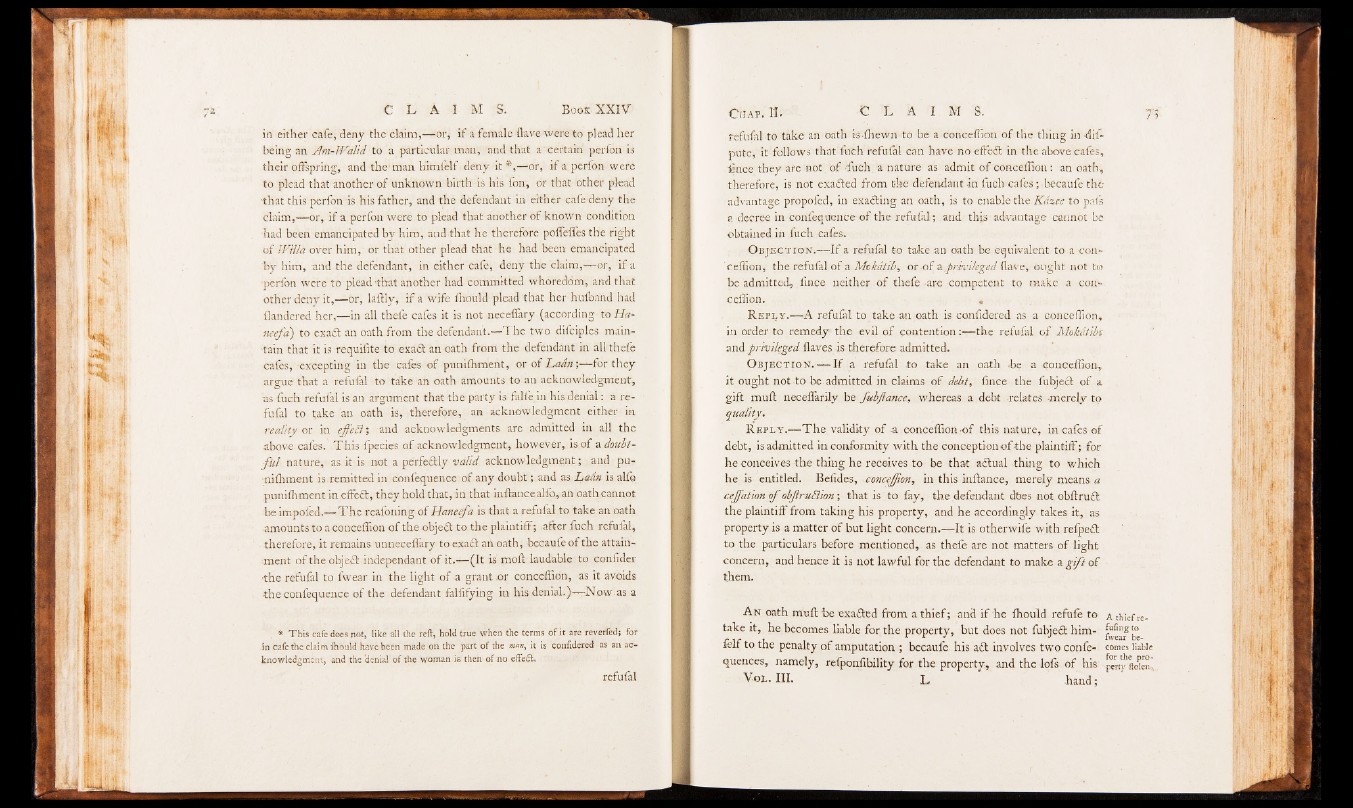
in either cafe, deny the claim,— or, if a female (lave were to plead her
being an Am-Walid to a particular man, and that a'certain perfon is
their offspring, and the man himfelf deny i t * ,—or, if a. perfon were
to plead that-another of unknown birth is his fon, or that other plead
-that this perfon is his father, and the defendant in either cafe deny the
claim,— or, if a perfon were to plead that another of known condition
had been emancipated by him, and that he therefore pofTeffes the right
of IVilla over him, or that other plead that he had been emancipated
by him, and the defendant, in either cafe, deny the claim,'— or, if a
•perfon were to plead-that another had committed whoredom, and that
other deny it,— or, laftly, if a wife fhould plead that her hufband had
flandered her,— in all thefe cafes it is not neceffary (according- to Ha-
neefa) to exadt an oath from the defendant.— The two difciples maintain
that it is requifite to exadt an oath from the defendant in. all thefe
cafes, -excepting in the cafes of punifhment, or of Laan',— for they
argue that a refufal to take an oath amounts to an acknowledgment,
as fiich refufal is an argument that the party'& fa-lfe in his denial : a refufal
to Çake an oath is, therefore, an acknowledgment either in
reality or in eff'eEl-, and acknowledgments are admitted in all the
•above, cafes. This fpecies. of acknowledgment, -however, is of a doubtf
u l nature, as it is not a perfectly valid acknowledgment; and punifhment
is.remitted in confequence of any doubt ; .and as Laân is alfa
punifhment in effedt, they hold that, in that inftance,alfo, an oath.cannot
beimpofed.— T h e reafoning of Haneefa is that a refufal to take an oath
•amounts to a conceffion of the objedt to the plaintiff ; after fuch refufal,
therefore, it remains unneceflary to exadt ail oath, becaufe of the attainment
of the objedt independant of it.— (It is moft laudable to confider
-the refufal to fwear in the light of a grantor conceffion, as it avoids
the confequence of the defendant falfifying in his denial.)—-Now.as a
* T h is cafe does not, like all the reft, hold true when the terms of.it are reverlëd; for
.in cafe the claim fhould have been made on the part o f the man, it is confidered as an acknowledgment,
and the 'denial o f the woman is then o f no effedfc.
refufal
refufal to take an oath is fhewn to be a conceffion of the thing in dispute,
it follows that fuch refufal can have no effedt in the above cafes,
•fince they are not of 'fuch a nature as admit of conceffion: an oath-,
therefore, is not exadted from the defendant-in fuch-cafes; becaufe the
advantage propofed, in exadting an oath, is to enable the Kdzec to pais
a decree in confequence- of the refufal-, and this -advantage cannot be
obtained in fuch cafes.
O bjection.— If,a refufal to take an oath be equivalent to a conceffion
; the refufal of a Mokatib, or of a ,privileged Have, ought not t®
be admitted, fince neither of thefe-are competent to make a conceffion.
„
R e p l y .— A refuial to take an oath is confidered as .a Gonceffion,
in order to remedy- the evil of contention :—the refufal: o f Mok&tibi
and privileged ilaves is therefore admitted.
O bjection.— If a refuial -to take an oath be -a -conceffion,
it ought not-to lie admitted in claims of debt, iince the fubject of a
gift mull neeeflarily be fubflance., whereas a debt -relates -merely to
quality.
R epl y .— T h e validity of-a conceffion-of this nature, in cafes of
debt, is admitted in conformity with the conception o f the plaintiff; for
he conceives-the thing he receives to be that adtual thing to which
he is entitled. Befides, conceffion, in this inftance, merely means a
cejfation o f obftruB'ton; that is to fay, the defendant dbes not obftruct
the plaintiff from taking his property, and he accordingly takes it, as
property is a matter of but light concern.— It is otherwife with refjsedt
to the particulars before mentioned, as thefe are not matters of light
concern, and hence it is not lawful for the defendant to make a g ift of
them.
An oath muff be exadted from a thief; and if he fhould refnfe to a thief re-
take it, he becomes liable for the property, but does not fubjedt him- “
felf to the penalty of amputation ; becaufe his adt involves two confe- comes liable
quences, namely, refponfibility for the property, and the lofs of his pertpftoknv
V-ol. Ill, L band;